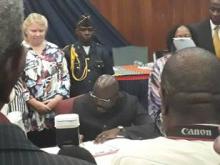Land Library Search
Through our robust search engine, you can search for any item of the over 73,000 highly curated resources in the Land Library.
If you would like to find an overview of what is possible, feel free to peruse the Search Guide.
/ library resources
Showing items 1 through 9 of 17.This guide takes communities and their leaders, and 'ocal and national civil society organisations, through the steps needed to ensure that land investments in the community are carried out inclusively and responsibly.
This guidance aims to provide companies with an overview of the links between land and human rights enshrined in these agreements and in official statements issued by treaty monitoring bodies.
In a watershed moment for land rights in Liberia and across Africa, President George Weah on Sept. 19 signed into law a land reform bill that extends land rights to millions of rural Liberians.
Land is the most important asset for many rural Liberian women and men, and is often a family’s primary source of cash income, food and nutritional security, health care, and education.
Follow Rose, and see her impact, as she travels the Rwandan countryside educating communities about women’s r
The Landesa Center for Women’s Land Rights developed the Women’s Land Tenure Framework to assist anyone who is interested in understanding the complex issues associated with women’s land rights — officials, grassroots organizations, international technical advisers, policymakers, development prac
The security of women’s entitlement to land and land-based resources in the East Africa region has been compromised by a combination of unfavourable laws and government policies, socio-economic change toward greater commoditization of and competition for land and land-based resources, and exclusi
The report covers activities and outcomes of various projects for enhancing women’s access to land and land titles in Kenya, Mozambique, Madagascar, Nairobi and in other areas of East and Southern Africa, as well as raising awareness about women’s land rights.
The marginalization of women with regard to property ownership has hampered efforts for poverty alleviation and the improvement of livelihoods. In Uganda, current institutionalization of land reform necessitates inquiry, to determine whether women’s status has changed under new provisions.








